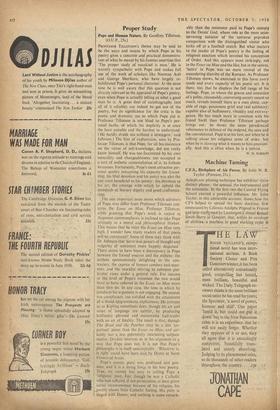Proper Study
Pope and Human Nature. By Geoffrey Tillotson. (O.U.P., 25s.) PROFESSOR TILLOTSON'S theme may be said to be the ways and means by which Pope in his poetry gives a concrete and practical demonstra- tion of what he meant by his famous assertion that 'The proper study of mankind is man.' He is warmly sympathetic with Pope and makes full use of the work of scholars like Norman Ault and George Sherburn, who have largely re- habilitated Pope's personal character. At the same time he is well aware that this question is not directly relevant to the appraisal of Pope's poetry, even when Pope is actually telling us what a good man he is. A great deal of autobiography (not all of it reliable) can indeed be got 'out of the poetry, but its significance for the critic is the poetic and dramatic use to which. Pope put it. Professor Tillotson is not blind to Pope's per- sonal faults, of which his duplicity is at once the least amiable and the hardest to understand. ('He hardly drank tea without a stratagem,' said Johnson.) The hint of explanation, seen by Pro- fessor Tillotson, is that Pope, for all his insistence on the virtue of self-knowledge, did not really know himself. He was too fascinated by 'his own versatility and changeableness, too occupied in a sort of ;esthetic contemplation of it, to fathom its causes. Fortunately, Pope's most attractive per- sonal quality (excepting his, capacity for friend- ship, his filial devotion and his piety) was also the one most beneficial to his poetry: his devotion to his art, the courage with ;The one important issue about which admirers of Pope, may differ from Professor Tillotson con- cerns the Essay on Man. Professor Tillotson, while granting that Pope's work is rooted in Augustan commonplaces, is inclined to talj Pope seriously as a moral, and philosophical thinker. This Means that he rates the Essay on Man very high. I wonder how many readers of that poem will be convinced? Some of them may thinli with Dr. Johnson that 'never was penury of thought and vulgarity of sentiment more happily disguised.' There seems to have been a discrepancy, ,in Pope between the formal essayist and the ;esthete; the aesthete spontaneously delighting in the con- trariety, the caprice of human conduct anct,man- ners, and the moralist striving, to subsume par- ticular cases under a general rule. For success at the level of Pope's intention the two would have to have cohered in the Essay on Man more than they do. In any case, the, tone in which he conducts his argument is not engaging. He sounds too complacent, too satisfied with the attainment of a bland epigrammatic explicitness. He irritates us as Kipling sometimes does, though his art and sense of language are subtler, by producing brilliantly phrased and memorable half-truths with an air of finality. The result is that, though Tire Hind ,and the Panther may be a less 'im- portant' poem than the Essay on Man, and cer- tainly has a less potentially• interesting subject- matter, Dryden interests us in his argument in a way that Pope does not. It is not that Pope's philosophy is in itself unacceptable : ,'Whatever is, is right' could have been, said by Dante or, Saint Francis of Assisi. . Pope's cosmic piety was profound and gen- uine, and it is a living force in his best poetry. True, we cannot feel easy in calling Pope a 'religious' poet.. For, though he was a Catholic who had suffered, if not persecution, at least grave social inconvenience because of his religion, his poetry shows little Catholic feeling. His piety is tinged with Deism; and nothing is more remark- able than the reverence paid in Pope's century to the Deists' God, whose role as the mere unin- tervening initiator of the universe provokes comparison with the distinguished visitor who kicks off at a football match. But what matters to the reader of Pope's poetry is the feeling of religious sanction which invested his conception of Order. And this appears most strikingly, not in the Essay on Man and the like, but in the satires. 'Satire' in Pope was no mere revival of the meandering diatribe of the Romans. As Professor Tillotson shows, he exercised in this form every mode and every capacity of his poetic art. It is there, too, that he displays the full range of his feelings. Pope, to whom the graces and amenities of a polite, reasonable, conversing society meant so much, reveals himself there as a man alone, cap- able of rage, passionate grief and real subliMity; capable also of buffoonery, ribaldry and extrava- ganza. He has much more in common with his friend Swift 'than Professor Tillotson perhaps brings out :' he shows the same paradoxical vehemence in defence of the ordered, the sane and the conventional. Pope is at his best, not when he is talking about his religious sense of order, but when he is showing what it means to him emotion- ally. And this is often when he is a satirist. W. W. ROBSON


















































 Previous page
Previous page